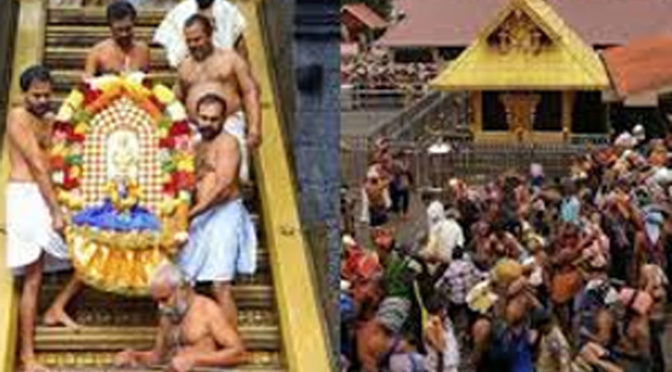Sabarimala and the Legitimacy of ‘Social Emancipation’
Posted on : April 21, 2019Author : AGA Admin

The recent Supreme Court decision in the Sabarimala case leaves a number of issues unresolved.[i]While the validity of the custom banning menstruating women between the age of 10-to-50 from entering the Sabarimala temple of Lord Ayyappa cannot be supported it is also true that religion is a matter of mythological beliefs, customs and practices based on concepts of immortality, rebirth, different avatars etc. “Religion is a matter of faith, and not of logic. It is not open to a court to accept an egalitarian approach, over a practice which constitutes an integral part of religion.”[ii] It is in this background that an assessment of the on-ground effects of this judgment and comment on the recent protests regarding the same assumes significance.
The Supreme Court consists of judges with advanced legal reasoning and knowledge and thus is a legitimate legal authority on matters of law. But its ability to decide on matters pertaining to religion is questionable as no body of secular judges can said to have the requisite specialized knowledge of all the religions and more importantly, the intensity of faith in order to understand and emulate the feelings of a devoted worshipper. This is evinced by the fundamental right given by article 26 of the constitution[iii] enabling religious denominations to manage its own affairs in matters pertaining to their religion.
Justice Chandrachud has stated that the Indian constitution was envisaged as a transformative document to facilitate social emancipation for all classes and communities.[iv] But one needs to keep in mind that the same constitution was meant be an accommodative document which would act as a safeguard for the rights of different groups under a secular polity. This must be seen in the context of the wide variety of religions, sub groups within the religion, social and tribal entities who coexist in India. Interference of courts, therefore, should be limited to a role of a mediator when there is an internal dispute with respect to a religious practise.
Any religious practise though grossly irrational or logically incoherent, are reverently followed by worshippers of that religious denomination, and thus only these worshippers should have the right to initiate social reforms in their religion. This internal dissent within religious communities should be a pre-requisite for the courts and the legislature to interfere in matters relating to certain customs and practices.
For example, in Hindu law, codification and reform was achieved after rigorous debate by the legislature during the 1950’s that led to the introduction of various Hindu Code bills. This change was all the more effective as the government is the direct representative of the people and is in a position to openly debate religious disputes, reigning arguments of different stakeholders.
Reformist movements against retrograde religious practices such as social excommunication in DawoodiBohras and instant Triple Talaq in the Hanafi school of Islam are all led by members of the same religious denomination who have challenged the practise based on the tenets of their religious law.[v]
When dissent originates from a group of worshippers within the religion the job of the court is reduced to determining the case based on religious principles, rather than utopian ideals of constitutional morality. This requirement of internal dissent is crucial for the court’s decision to be acceptable and gain legitimacy within the community.
And, as we have seen in this case of Sabarimala, any external interference from a judicial or law-making body will always be viewed as an uncalled-for interference from people who don’t understand their religion. However, logically and legally coherent the judgment- it will have little support in its actual on ground implantation if it alienates the very people whose problems it seeks to cure. Equality is an idea, which has to be nurtured and imbedded in the minds of the people only then can it be successfully implemented, no amount of Court orders can force the people to change. The judgment has been grossly misused by people who do not conform to that specific sect- Journalists, failed actors and small-time political leaders in order to furnish their selfish interests and stroke fire in a peaceful society.Unless this reform originates from within, the court’s orders remain futile and un-implementable.
Gaj Singh
Intern, AGA
[i]Indian Young Lawyers Association v. The State of Kerala, Writ Petition (Civil) No. 373 of 2006
[ii]ShayaraBano and others v. Union of India and others, Writ Petition (C) No. 118 of 2016
[iii]The Constitution of India, 1950, 26
[iv] Supra 1
[v]Silpi Jain &Gaj Singh, THE SABARIMALA VERDICT: INTERNAL DISSENT- A PREREQUISITE FOR SOCIAL REFORM? NUJS constitutional Law Society Blog, December 2018
(The views expressed in the article belong to the author and do not reflect the position of Asia in Global Affairs)





Leave a Reply